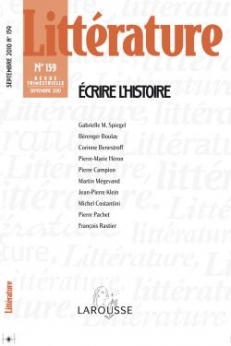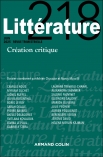
Littérature n° 159 (3/2010)
Pour acheter ce numéro, contactez-nous
Recevez les numéros de l'année en cours et accédez à l'intégralité des articles en ligne.
Réfléchir au révisionnisme historique comme moteur du changement en historiographie, à l’origine de changements de paradigme selon la terminologie de Kuhn, et non dans son sens plus restreint mais affilié de « négationnisme », conduit à analyser les dernières quatre décennies de « tournant linguistique », lié au postmodernisme et au poststructuralisme français tel qu’il fut adopté par les universitaires américains ayant démarré leur carrière dans les années 1960. Ce tournant n’est pas seulement lié au passage des capitalismes d’État à la mondialisation, mais encore à ses origines chez des penseurs français de la génération postérieure au génocide confrontés à l’héritage de la pensée allemande.
To reflect upon revisionism in history as its mode of change, akin to Kuhn’s change of paradigm, and not in its narrow but affiliated sense of what the French call « negationism » (denial of the Holocaust), leads to analysing the last four decades of the historiographic « linguistic turn » as linked to French postmodernism and poststructuralism revisited by American academics recruited in the 60s. It is not only linked to the shift from nationstate capitalisms to globalisation but also to its origins among French thinkers of the post-genocidal generation confronted with German philosophy after the Holocaust.

